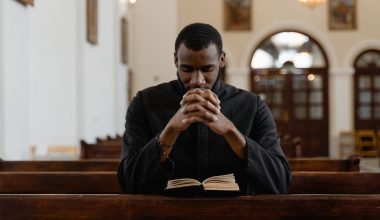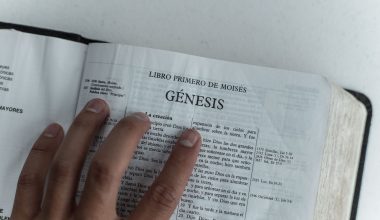In the cosmos, there exists a moment of unparalleled significance, a divine masterpiece painted with cosmic brushstrokes. It is the moment when, according to religious and philosophical traditions, humanity came into being—a moment of profound mystery and wonder.
The creation of man has captivated the imagination of generations, sparking debates, inspiring art, and shaping the core beliefs of cultures across the globe. In this exploration, we venture into the heart of this timeless narrative, seeking to understand the origins, significance, and enduring resonance of the creation of man.
From ancient myths to modern scientific inquiries, join us as we unravel the layers of this remarkable story that continues to define our existence and our quest for meaning.
“So God created man in his image, in the image of God created he him, male and female created he them” (Genesis 1:27).
The Creation of Man (Genesis 2:7-25).
In the previous chapter, we were introduced to the creation and preparation of the material universe, with a particular focus on the earth for man’s habitation and control. Our text today summarizes the act and purpose of man’s creation. Man is the crown of God’s creation, and he alone was
made in the image of God (Genesis 1:27). This means he has God’s nature of self-consciousness, righteousness, holiness, and love.
He also can act as a free moral agent responsible and with enough intelligence to choose right or wrong. The tri-unity of God is reflected in man’s tripartite nature of spirit, soul, and body (1 Thessalonians 5:23; Hebrews 4:12).
Consequently, man can worship God spiritually and yet have physical contact with the material world. Given this revelation that man was created in God’s image, every human deserves honor and respect irrespective of his race and social status.
Though the body is mere dust worth a small amount, it will cost more than all the world’s treasures to form and assemble the over seventy-five trillion cells of the body into a functioning unit.
Suppose one human body is compared to an artificial factory with the heart, eyes, ears, jaws, brain, liver, kidneys, and other organs acting as machines. In that case, the maintenance cost just for a month will make such a factory humanly impossible.
How great is God, who makes billions of men and sustains them for years? The soul of man is even more valuable because it is God’s breath in man. On the value of the soul, the Lord Jesus asked:
“For what shall it profit a man, if he shall gain the whole world and lose his soul? Or what shall a man give in exchange for his soul?” (Mark 8:35,36).
Given this, men ought to give more attention to the eternal welfare of their souls. While the body can be maintained by physical bread, the soul needs “every word that proceedeth out of the mouth of God.” To neglect the word of God in preference to physical food is to ignore life in preference to death.
Divine Providence For Man (Genesis 2:8- 15,18,21-23).
In wisdom, God first created the earth and everything necessary for man’s comfort before starting him. The exercise of divine foresight and forethought provided for a man several things: a garden for a home, the tree of life, dominion over the animals, and a wife. God planted a garden and put the man there.
Eden’s description shows it was a place of absolute security, abundant supply, and aesthetic source. It was a well-watered garden of delight which formed the basis of four great rivers. Pison, Gihon, Hiddekel (Tigris) and Euphrates.
The water and rivers at this point become significant when one remembers that the ground was being watered by a mist because there was no rain yet (Genesis 2:6). But God provided rivers of water for Adam to teach us how God will abundantly supply our needs even if there is scarcity all around.
The man was placed in the Garden of Eden to dress and keep it. God will have man learn very early that along with privileges come responsibilities. God’s gifts and grace are to enable us to carry out specific duties in His kingdom. Where there is a responsibility, there is accountability, and we are expected not to be idle or lazy.
God also provided the Tree of Life to make him live forever. But sin marred this privilege. The man was commanded to “freely eat of every tree in the garden except the tree of knowledge of good and evil”.
Here we should observe that God’s prohibitions are fewer than His provisions. But the devil will have us think that the bans are too many as if God is a prohibitionist who delights to spoil our enjoyment or curtail our freedom.
Decision That Determines Destiny (Genesis 2:16,17; 3:1-6; Romans 5:12).
“And the LORD God commanded the man, saying, of every tree of the garden thou mayest freely eat: But of the tree of the knowledge of good and evil, thou shall not eat of it; for in the day that thou eatest thereof, thou shalt surely die” (Genesis 2:16,17).
The tree of the knowledge of good and evil was a symbol of death. I was eating “every tree of the garden” besides the tree of the knowledge of good and evil symbolized man’s willingness and decision to depend on God for life sustenance.
Eating the Tree of the Knowledge of Good and Evil is a declaration of independence and rejection of God’s authority.
God gave man a chance to determine his destiny by his choice. When God said, “thou shalt surely die,” a Hebrew scholar pointed out that it implies in dying, thou shalt surely die.” This causes a spiritual death to be followed by a physical end. Adam chose death, and thereby, all men came under the regime of death.
“Wherefore as by one man sin entered into the world and death by sin; so death passed upon all men, for that, all have sinned” (Romans 5:12).
Man is still faced with the choice between Christ or Satan. Even after making the right choice, we are to renew our view and concentration to walk narrowly daily as we renounce sin and remain loyal to God.
Divine Provision Of A Partner For Adam (Genesis 2:22-25; Hebrews 13:4).
God declared Adam’s need for a companion, creating a fitting help meet for him. The creation of a partner for him was neither an omission nor an afterthought on God’s part because “known unto God are all his works from the foundation of the world”.
Before creating the woman, God allowed Adam to exercise his given dominion by naming the animals. People show their authority over others by giving them names or changing their names. Not only did Adam manifest authority, but he also demonstrated his great intelligence by single-handedly naming all the animals.
After naming all the animals, there was no help found for Adam, and as it were, Adam still had one name on his lips: “Woman.” God eventually created one out of Adam’s ribs and was brought to him.
Adam’s response should characterize the attitude of every man toward his wife. In the statement of Adam, we observe appreciation, acceptance, affection, and approval of the partner God gave him.
Conclusion
As we conclude our journey into the creation of man, we find ourselves at the crossroads of science, spirituality, and philosophy. It is a story that transcends cultural boundaries and resonates with the deepest yearnings of the human soul—a quest for understanding, purpose, and connection.
Whether we view it through the lens of religious scripture, the insights of evolution, or the wonders of consciousness, the creation of man remains a symbol of our enduring curiosity and our relentless pursuit of answers to life’s most profound questions.
In the myriad interpretations of this tale, one common thread emerges; the notion that humanity occupies a unique place in the cosmos. It is a story of hope, potential, and responsibility.
The creation of man reminds us that each individual, in their own way, is a living testament to the mysteries of existence, and our journey to uncover the truth of our origin continues to shape our collective identity.
As we step away from this exploration, may we carry with us the awe and wonder that this story inspires, and may we continue to seek knowledge, embrace diversity, and foster compassion in our shared human experience.
The creation of man, a story as old as time itself, continues to unfold, leaving us with an unending journey of discovery and self-realization.
FAQs
1. Why is man considered the crown of God’s creation?
Man is often considered the crown of God’s creation because, in many religious and philosophical traditions, humans are believed to possess unique qualities such as reason, consciousness, moral agency, and the ability to reflect the divine image, setting them apart from the rest of creation.
2. Briefly state evolutionists’ claim and point out how the biblical account of creation disproves it.
Evolutionists claim that species, including humans, have evolved over millions of years through natural selection and genetic variation. This contrasts with the biblical account of creation, which asserts that God created all species in their current form.
The main point of contention is the timeline, with evolutionists relying on scientific evidence supporting gradual change over eons, while the biblical account suggests a much shorter time frame.
3. Why do you consider that man is fearfully and wonderfully made?
The phrase “fearfully and wonderfully made” is often used to emphasize the complexity and intricacy of the human body and mind.
Many consider humans to be fearfully and wonderfully made due to the astonishing biological, cognitive, and emotional capabilities that set them apart from other creatures. This perspective often reflects a sense of awe and wonder at the intricacies of human existence.








